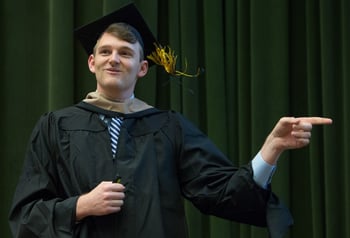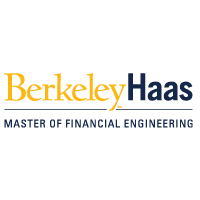It’s been four months since the MFE Class of 2017 graduated - time to check in on our recent alum! Today, we’re reconnecting with Alexander “Xander” Olson to see what he’s been up to since completing the Berkeley MFE Program.


Berkeley MFE: Tell us about what brought you to the Berkeley MFE. You spent a few years with an investment consulting company and then started your own hedge fund - what was your thought process?
Xander: During my time at Cambridge Associates, my colleague, Richard, and I spent a lot of time building statistical models to invest in equities and options. Over a period of 3 years, we built and refined them to the point where we were comfortable running our personal capital on their basis. While we generated a track record on our personal capital, we spoke to as many people as possible about what we were building in order to get feedback and improve our models. Eventually, after many conversations with friends and family, we launched Convergence Capital Management Group with the addition of their capital.
While running the fund, our process was approximately 70-80% systematic as we had a human layer of judgement at the end. Our models would generate opportunities and then we would do our due diligence on each position. Sizing and risk management were almost entirely systematic. Personally, throughout this time, I thought about methods to make the process fully automated as we wanted to take human emotion out of the investment process. We had this goal in mind because the academic research on investing agrees that a majority of underperformance can be attributed to human actions in the investment process. I began looking at programs like the Master of Financial Engineering at UC Berkeley because it combines heavy statistics, math, and programming. This was the exact skillset that would let me fully automate investment strategies as well as ensure that they are statistically robust.
After attending many information sessions, both webinars and in person, I determined that the MFE would help me invest in a more rigorous manner and in the way I hoped to run our fund. The diverse skillset and impressive backgrounds of the students and faculty in Berkeley’s MFE drove me to apply to the program. In addition to the students and faculty, the program’s rankings and ability to place students in top-tier firms and the sterling reputation of the program’s Executive Director, Linda Kreitzman, proved to me that the Berkeley MFE was the right choice.
Berkeley MFE: How was your experience here?
Xander: During my time at the MFE, I experienced the cutting edge of the quantitative finance industry. One of the classes, in particular, Asset Backed Securities, taught by Professors Nancy Wallace and Christopher Palmer, shows how the MFE represents the forefront of the industry. Both professors are extremely accomplished outside of the classroom and may seem intimidating because of these accomplishments; however, they both remained approachable and encouraging to each of us. The class focused on the securitization of different assets into payment tranches, including unconventional assets like cancer drug patent revenues. After learning the basics of securitization, we began analyzing large datasets to price these securities. The combination of big data programming and the ability to price complex securities taught me an extremely valuable skillset. The class concluded with a final project that allowed us to investigate the securitization of new fintech assets, such as the loans from Prosper, SoFi and Lending Club. Through this project, we pushed the edges of the securitization industry and built useful experience that we can apply to our full time jobs.
In addition to impressive coursework, the MFE also brings in industry experts, such as hedge fund managers and traders, to teach seminars throughout the year. These seminars allowed me to learn about how financial engineering is applied in practice and gave me the opportunity to meet with potential employers. For example, we had large asset managers like BlackRock and The Voleon Group teach us about how they generate alpha. Learning about the inner workings of these firms gave me a unique view of the current stage of the industry.
Berkeley MFE: It’s an intense year – is there life outside of the classroom?
Xander: It was an extremely intense year. Everyone who attends the MFE knows that they come to the program to work hard and come out a stronger quant at the end. Although we worked very hard, we did maintain lives outside of the classroom. Each term, students work in a group to complete assignments and projects. Since the student body comes from a diverse background, I learned many skills from people who were experts in their skillset, from programming to statistics and machine learning. The time spent working together into the late hours of the night forged friendships that will last my whole life.
In addition to the group projects, the Financial Engineering Students Association (FESA) organized social activities for the whole class to participate in. For example, we held an unlimited pizza and beer event as a celebration for surviving the second term. We also arranged a ski trip to Lake Tahoe for all of the students over a weekend. These events helped us to relax and ensure that we maintained a life outside the classroom.
Berkeley MFE: You interned with an asset management firm, and then joined Google after graduation. What do you do at Google now? How does that relate to your MFE?
Xander: I am a Data Scientist at Google. A large portion of what I do relates to the statistics that I used to locate alpha signals at PanAgora. On a daily basis, I use the statistical skills learned in Empirical Methods as well as the scientific rigor Professor Eric Reiner taught us. Furthermore, the deep understanding of machine learning that we built during the Applied Finance Project helps me build and review predictive models. The MFE teaches a skillset that many industries value highly.
Also, enduring the MFE Program taught me how to work hard and excel. Upon leaving the MFE, I learned that my fellow students were elite performers and I was lucky to work with such high-performing individuals. The ability to perform at an extremely high-level allows me to more effectively contribute to my team at Google.
Berkeley MFE: What advice do you have for our readers?
Xander: My advice would be to attend an info session to learn more about the program. Then, I would say that they go ahead and apply. During the application process, the MFE Office provides feedback as well as coursework recommendations in order to make your application stronger. In my case, I had to take 4 courses, the pre-program courses, and read multiple books before starting the program. All of these requirements as well as the guidance from the MFE Office prepared me to thrive in the program. I would suggest that anyone thinking about the MFE go ahead and apply because then you can learn where you need to improve in order to attend the program. The MFE Program changed my life and I am grateful for all of the folks there.
Berkeley MFE: Thank you for your time and kind words, Xander; we look forward to hearing about your success at Google!
For the most up-to-date info, follow us on Facebook, Twitter, and LinkedIn. Learn more about the Berkeley MFE Program and how we can help you launch your career by going to our website.







